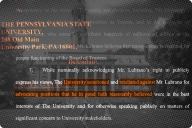You have /5 articles left.
Sign up for a free account or log in.
The University of Florida finds itself without an administrator to head its online degree-granting arm, UF Online, after its director resigned after two months on the job.
Elizabeth D. (Betty) Phillips, former executive vice president and provost of Arizona State University, joined Florida in January in time for a launch that capped a mad dash to to get UF Online up and running for its first 500 students. Her resignation was announced in administrative memo Wednesday night, and the news was first reported by The Gainesville Sun.
Phillips, formerly Capaldi, was seen as a great fit to lead Florida's online degree-granting initiative. She had previously spent more than a decade there as a professor and provost before leaving for ASU, where she helped manage a similar entity, ASU Online. Phillips also provided experience dealing with Pearson, which both ASU and Florida have partnered with to produce online degree offerings. (Technically, Florida initially enlisted the services EmbanetCompass, which Pearson acquired in October 2012.)
Until Florida can fill the position, W. Andrew McCollough, associate provost for teaching and technology, will lead UF Online. He said Phillips has chosen to return to ASU as a faculty member.
"She, in discussing the matter with me, had evinced after she had gotten herself immersed in the management of and the directing of UF Online that her first love at this point was functioning as a faculty member and doing research on online learning," McCollough said. "It became evident to her that she would have difficulties fitting that preference into her waking hours here at the university."
Janine Sikes, assistant vice president for media relations and public affairs at Florida, said Phillips will "pursue research into effective systems for personalized and adaptive learning" at ASU.
That appears to be part of what Phillips hoped her time at Florida would involve. In an interview last September, Phillips said she looked forward to researching adaptive learning and other forms of educational technologies as part of UF Online. "I am a psychologist, and learning is my area. I'm very interested in how we can teach better, both for face-to-face students and online using technology," she said then.
Phillips did not respond to an interview request on Thursday.
Sikes said the university had developed an academic and business plan before Phillips took over for McCollough at the start of the year, and that Phillips’ departure does not affect the timeline laid out in it.
“The work doesn’t stop because the person in the director’s seat changes,” McCollough said. “The truth of the matter is in the work that is being done by faculty and instructional designers and videographers and web developers and marketing. The people that are doing the real work continue to do the real work.”
McCollough said the university intends to fill the vacancy by this summer. “In the meantime, I will pick up where I left off back in December and work at keeping this train running,” he said. “It’s got momentum and people and students, and we’re on the road to success.”
Todd Hitchcock, COO of Pearson Embanet, said he was disappointed to see Phillips leave, but added that course development won’t be affected. “She’s obviously a strong leader in online learning,” Hitchcock said. “We of course have a partnership with UF Online, and ... it hasn’t changed their goals or objectives as an institution, and hasn’t really changed our approach.”
UF Online launched on Jan. 6 with about 95 courses spread across majors such as business administration, criminology, environmental management, health education and behavior, and sports management. Those degree options will be joined by another 50 courses this summer and five new majors in the fall: biology, computer science, nursing, psychology and telecommunications, McCollough said.
UF Online is this semester serving 583 transfer students, and the first cohort of first-time-in-college students will enroll this fall. McCollough said the university is aiming to enroll between 750 and 1,000 total students, about 100 to 150 of whom will start as freshmen.








